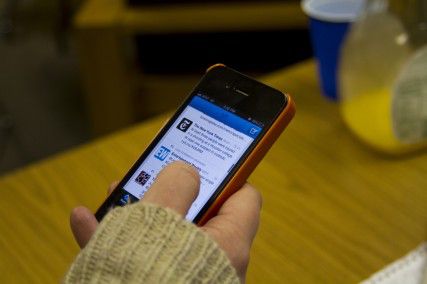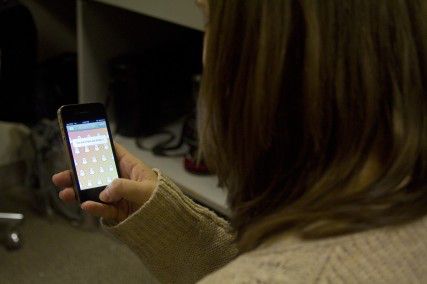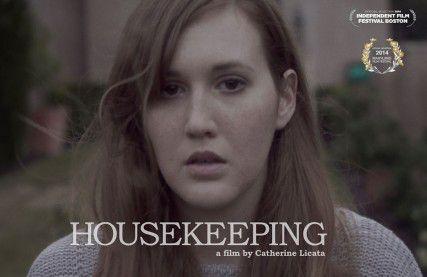Social media has become an undeniably integral component of the lives of students and professionals. With the overwhelming number of ways to connect to people online, mobile devices further allow students to keep up their online accounts on-the-go.
David Kartunen, a College of Communication lecturer at Boston University, said social media interests people because it allows for the creation and management of stories about themselves. He said it is a self-centered, consumer-driven product, in that people who utilize the programs make the content.
“Everyone is interested in stories about themselves,” Kartunen said. “That’s what, in particular, Facebook and, to a lesser extent, Twitter, have sought to do. Facebook is this flag in the sand of everything that is important to you — your photos, your friends, your causes, your interests. However much you put into it is what you get back to it.”

Consequences of immediate social media
Kartunen said there are physical and sociological consequences to living life constantly on one’s mobile device.
“They’ve outlawed [using your phone] when you’re driving,” he said. “You can get hit by the B-Line if you’re walking across Commonwealth Avenue and doing these things. There are physical consequences to this behavior.”
However, the sociological consequences are equally detrimental, he said.
“It concerns me that we are not having any unique experiences anymore — that we are experiencing life through our phones as opposed to in our periphery,” Kartunen said. “Life is driven through this device now, as opposed to things that are actually happening.”
He said newer generations have become more dependent on mobile social media as they are more accustomed to the technology.
“Is there going to be less interaction among the incoming class of freshman at Boston University in Warren Towers because, while they live in shoe boxes side-by-side, they’re connected somewhere else on their phones and they’re never engaged?” Kartunen asked.
Though the technology is ever evolving to meet the consumers’ demands, Kartunen questioned whether more is actually better.
“While it’s an amazing thing that we can connect and be connected to people who are important to us in our lives, no matter how many miles they are away from us, I worry that it inhibits us from being connected to the people around us,” he said.
Students’ uses of social media apps
Although social media has seemingly taken over students’ day-to-day lives, there seems to be nothing stopping them from downloading applications to their mobile devices.
College of Arts and Sciences freshman Marissa Mugan said mobile social media apps help her stay in communication with her friends and family while she is away at college.
“It’s an easy way to stay connected without the hassle of trying to find a good time to talk on the phone,” Mugan said.
Mugan said she mainly uses Facebook, Twitter, Instagram and Snapchat.

Photo illustration by Michelle Jay
“Everyone has them so it’s easy to connect with my friends and family through them,” she said. “I use Facebook the most.”
Mugan said she regularly uses these apps throughout the day and, in some way, she depends on social media.
“It’s a way to pass time in long lines, while also staying connected to your friends and seeing what they’re up to,” she said. “Especially since we’re in college or not at home or with a lot of the people we’ve known most of our lives.”
Rachel Coll, a CAS freshman, said mobile social media apps are convenient because mobile devices are portable and wireless.
“Otherwise I would have to take my laptop everywhere and that’s annoying,” Coll said.
As an international student, Coll said she finds these apps especially helpful in keeping in touch with her friends and family.
“[I check] Facebook a few times a day,” Coll said. “When people contact me, it helps because I live abroad. I never used to be on it at home [in New Zealand], now I’m on it 24/7.”
She said she uses typical apps such as Facebook, Snapchat and Scrabble. However, she also uses Viber, an application that allows users to make free international calls.
“I can talk to anyone through the internet internationally for free,” Coll said. “That’s what I use mostly for my family. It helps 100 percent. If I didn’t have these, I wouldn’t be here [in the States], truly.”
Coll said she uses Facebook and Snapchat to stay in touch with her friends at home, who live in a different time zone.
“If people message me from home, I can respond later if I’m in class,” Coll said. “Snapchat is just fun because you can send stupid things [to your friends] and you don’t have any consequences.”
Ronen Banerjee, a School of Management sophomore, said he uses Facebook, Twitter, Google Plus, and Instagram. He said social media is everything.
“Facebook is obviously more useful than everything else, because everyone is on it,” Banerjee said. “Not everyone has a Twitter handle or Google Plus, but it is pretty helpful.”
He said he considers Twitter to be more of a news source, whereas Facebook is more to keep in touch with friends and family.
Vanessa Merta, a sophomore in the College of General Studies, said social media allows her to maintain relationships.
“I have a long-distance relationship, so [social media apps] definitely help,” Merta said. “Snapchat helps me feel like I’m with my friends when I’m [physically] not.”
Merta said she checks the sites on her cellphone too often. She mainly uses Instagram and Snapchat, but prefers to text her friends, rather than using Facebook Messenger.
“You can interact with your friends from home and stay connected,” Merta said. “It’s more personal.”
Rising Apps
Some apps, like Facebook and Twitter, have been around for a while, but others like Snapchat are gaining popularity. Apps seem to grow in popularity depending on whether they are free, how well they function, and if they can connect to others.
Mugan said she chooses apps based on the ability of her friends to download them as well.
“If a lot of people don’t use the app, I don’t usually see the point in downloading or purchasing it,” she said. “Usually [I hear about new apps] through my friends. Once it becomes popular, it spreads like wildfire.”
Mugan said price does sometimes affect her decision in downloading an app.
“Most likely, I’d spend money on an app if it was like Instagram or Snapchat because everyone uses it,” she said. “So the amount that I’d use it would be worth the charge. [It depends on] popularity and price. I get most of my apps by looking through the popular page on the App Store, but the price is definitely a factor. ”
Coll said her friends play some role in her app-downloading decisions.
“If my friends recommend it, I’ll get it,” she said. “They want me to get Instagram, but I’m refusing. I don’t like taking photos and making them look pretty.”
Merta said she would pay for certain apps, but not necessarily social media apps.
“Yes, [I would pay for an app], but I wouldn’t pay for social media because it’s not worth it,” she said. “I’ll pay for games though. It depends on which one I can interact with more people on.”


















































































































Lawrence Sands • Jan 23, 2013 at 5:59 pm
Atta girl Alexandra !!!!
Papa
I found several new uses of social media. In particular the young lady from New Zealand being able to speak and exchange texts with her family while being about as far away from them as possible.
I am a talker and feel that the social media may make conversation a lost art. Body language is an embellishment that can not be put on paper or electrons. However, we will endure and the world will adjust.
Much love
Papa
PS Gram wants to know if you checked your PO box?